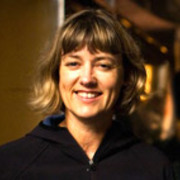
Fiona Copland
Fiona Copland was born in Patea, Taranaki, but grew up in Christchurch and Hastings.
After graduating with a history major from Canterbury University, Copland departed New Zealand for an OE that included a period working at an oil terminal in the Shetland Islands.
Back in New Zealand she got a job in television as a researcher for arts programme Kaleidoscope, which she describes as "the best part of my education". It led to a decade of directing and producing information shows and documentaries for Television New Zealand. Copland feels she was lucky to be one of the last director/producers trained in local television under the old public service model, with mentors and colleagues who really understood the craft. Significant influences in this period included directors Keith Hunter, Bruce Morrison, and network executive Hal Weston.
Copland left and developed an association with budding filmmaker Harry Sinclair. In 1997 the pair set up company John Swimmer Ltd and began making an offbeat ensemble story called Topless Women Talk About Their Lives. Centred on a group of young Aucklanders, and shot mostly on weekends, the project first emerged as a series of bite-sized segments on late night television. Thanks to a bright idea that could easily have gone nowhere, it also became a feature film which combined footage old and new, won rave reviews ("completely seductive" said The Sydney Morning Herald) and eight NZ Film Awards, and played at many international film festivals.
Copland worked on two more features with Sinclair: semi-improvised rural romance The Price of Milk in 2000 — featuring Karl Urban and Topless Women alumni Danielle Cormack — and philandering comedy Toy Love in 2002. This time she executive produced, handing the main producing duties to Juliette Veber.
Soon after Sinclair departed overseas (though they would reconvene years later for animated series Kiri and Lou) and Copland launched another production company: Filmwork Ltd, which went on to produce TVNZ art history series, The Big Picture, presented by veteran arts commentator Hamish Keith. The Big Picture won the Qantas Film and Television Award for Best Factual Series in 2008.
Mid 2009 saw the Kiwi debut of Copland-produced feature The Strength of Water. The film was shot in the Hokianga, and involves a Māori brother and sister in an isolated coastal community. The film was invited to festivals in Berlin, Rotterdam, Shanghai and Sydney. Written by playwright Briar Grace-Smith, the drama was directed by first-timer Armagan Ballantyne.
Copland followed it with Michael Bennett's big screen drama Matariki, which consists of five interwoven tales set in South Auckland in the days before Matariki. Invited to screen at the Toronto Film Festival, the film was released in New Zealand in November 2010. Herald writer Peter Calder gave it a four star review, praising the ensemble cast and a "script that is dramatic and affecting without ever being forced".
In 2017 Copland produced comedy Gary of the Pacific, the first feature from creative cooperative thedownlowconcept. Copland delved into the world of top level sport in 2022, executive producing Briar March's feature documentary about Kiwi double gold Olympian Dame Valerie Adams- More Than Gold
In 2019 Copland reunited with Harry Sinclair to produce Kiri and Lou, a lovingly hand-crafted stop animation series aimed at pre-schoolers. Sinclair, who devised the musical series with American producer Rebecca Kirschner was inspired to create a kids show that was a "bit more calm and not so frenetic". Dinosaur Kiri and best friend Lou negotiate all the 'big feelings' of being little as they wander around a New Zealand bush setting. Each episode features songs written by Don McGlashan. Voicing Kiri and Lou are Olivia Tennet and Jermaine Clement. Guest stars have included Kiwi musicians Julia Deans and Marlon Williams.
Kiri and Lou has clocked up over 80 episodes and in 2021 and 2024 won Best Childrens Programme at the New Zealand TV Awards. The series has enjoyed wide international success, winning a clutch of Asian Television awards and nabbing a 2022 Bafta nomination. A movie version is in production.
Production company Field Theory launched back in 2014; Copland partnered with fellow producers Philippa Campbell and Tim Sanders. Given start up funding by the NZ Film Commission, Field Theory's focus is "high-end film and television for the international market". Among the projects the company are developing are the Roger Donaldson-directed Guinea Pig Club, based on plastic surgeon Archibald McIndoe, and an adaptation of Elizabeth Knox sci-fi horror novel Wake.
Profile updated on 12 August 2025
Sources include
Fiona Copland
Kiri and Lou website, accessed 12 August 2024
Shaun Bamber 'Why the director of Kiri and Lou wanted to make kids TV set in NZ's native bush' - Your Weekend, 19 November 2022
Peter Calder, Review of Matariki, - The NZ Herald, 18 November 2010
Field Theory Media website. Accessed 12 August 2024
Filmwork website (broken link) Accessed 9 April 2015
Kirsten Johnstone, Marlon Williams profile, AudioCulture website. Loaded December 2020. Accessed 12 August 2024
Amanda Mills, Julia Deans profile, AudioCulture website. Loaded April 2020. Accessed 10 August 2024
'New NZ screen production company' (Press Release) The Big Idea website. Loaded 29 September 2014. Accessed 8 May 2019